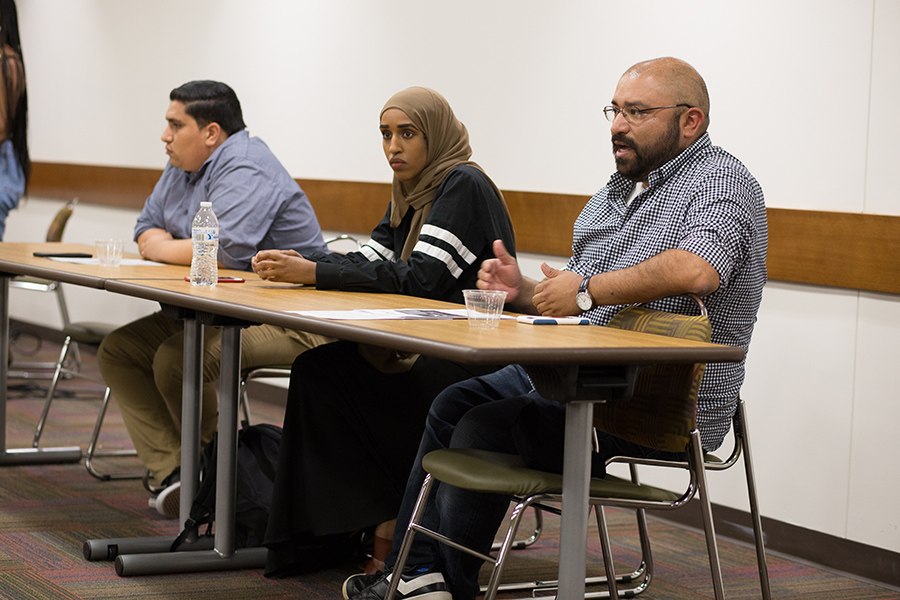A student honor society, Scholars Without Borders, hosted a panel discussion regarding President Donald Trump’s immigration and travel-ban executive orders in Templo Mayor on Thursday, April 20.
The discussion, titled “Breaking Down Barriers,” focused on how the executive orders affect students at SDSU, how the university administration is handling it, and what students can do to support undocumented individuals on campus.
The event was hosted by co-president of Scholars Without Borders Asha Alshabazz and membership director Luda Ivette Gonzalez. The panel included Brandon Rivera, an SDSU alumnus with a master’s degree in Communication, Rodrigo Gutierrez, who is a special programs coordinator in the office of Educational Opportunity Programs and Ethnic Affairs, and senior sociology major Aisha Sharif,.
Taylor Trummel, co-president of Scholars Without Borders, asked the panel about the fact SDSU has not declared itself a sanctuary campus.
Gutierrez said although the campus is not a sanctuary, SDSU announced in an email the university police department will not be working with federal immigration enforcement.
“This runs parallel with the city of San Diego,” Gutierrez said. “Kevin Faulconer, the city’s mayor, said San Diego is not a sanctuary city. However, he also says [he is] not going to be using resources of local law enforcement to work with federal authorities as immigration agents. So it’s kind of like a double-edged sword. I’m not a sanctuary city, but at the same time, I’m not going to follow your rules.”
Rivera said that the university is prevented from releasing immigration status to the federal government by the Family Educational Rights and Privacy Act, which protects student information from being released.
But Rivera also said that while the university administration has promised not to work with federal immigration enforcement, individuals, such as students, can report undocumented students to immigration agencies. He said undocumented students, even those who were protected under the DACA program during the Obama administration, should be careful about sharing their status.
“If I were on a college campus, and I were a DACA student, I would keep that information on a need-to-know basis,” Rivera said. “Even if you call yourself a sanctuary city, or a sanctuary campus… there is nothing safe about that. If you disclose your undocumented status to a classmate, there is no guarantee that information stays here.”
According to the Department of Homeland Security, 43 students who were protected under DACA during the Obama administration were deported during the first two months of the Trump administration.
Sharif said that while the email from the university helped to reassure students, more is needed to create awareness and dialogue around immigration policies and their affect on students.
“It’s one thing to send out an email and say, listen, we’re not going to give you guys up to ICE, we’re not going to work with federal immigration agencies,” Sharif said. “But what I would like to see out of students more often is that these conversations are happening all the time. We need more space, more conversation, more dialogue, about these issues that affect our students.”
Gutierrez also spoke about a project he is working on to develop a program for allies of undocumented students.
“We’ve started the groundwork for undocumented AB 540 ally training on the campus,” he said.
AB 540 is a California bill that provides undocumented students with access to financial resources to attend college.
Gutierrez said later this spring, the EOP is also creating a resource center and hiring an undocumented resource center coordinator for undocumented students.
“This person is going to be focusing on undocumented student issues here on campus, inside the classroom and outside the classroom, and working with them to get a safe space on campus,” Gutierrez said.
Gonzalez ended the discussion by asking how students and staff at SDSU can support undocumented students and others who are affected by the executive orders.
Gutierrez said students and staff can provide emotional support, but can also try to affect political change.
“If you want to start towards making change, it sounds cheesy, but call your representative,” Gutierrez said.








